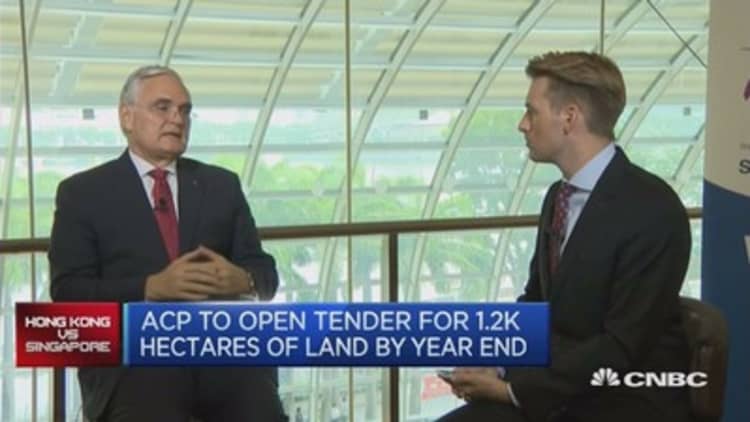The world's shipping players have a vested interest in preserving free global trade, and as they meet in Asia, they say they've grown unsettled by rising protectionism in Europe and the U.S.
"If you hear the rhetoric of the Trump or the Brexit debate, it is completely contrary to the way we see growth and trade. They always talk about it as a zero-sum game as if everybody who was a winner was a winner at somebody else's expense," Paddy Rodgers, CEO of crude oil tanker operator Euronav, said on Tuesday at the Sea Asia conference in Singapore.
"We see it as something mutually beneficial, but that's not the language that's being used by politicians," he said.
His comments came as protectionist rhetoric has surged in the wake of the U.S. presidential election and the U.K.'s referendum to exit the European Union.
Although U.S. President Donald Trump has since reneged on some of his protectionist campaign rhetoric, such as a vow to label China a currency manipulator on "day one," he has continued to target other U.S. trade partners.
U.S. Commerce Secretary Wilbur Ross said on Monday that anti-subsidy tariffs averaging around 20 percent would be imposed on imports of softwood lumber from Canada, Reuters reported.

The U.S. administration was also rumbling about potential tariffs on dairy imports from its Northern neighbor, with Trump recently week calling Canada's actions on the industry a "disgrace."
Additionally, media reports citing administration sources emerged on Wednesday that Trump was considering an executive order to remove the U.S. from the North American Free Trade Agreement, or Nafta. But later Wednesday evening, media reports said Trump had agreed in phone calls with the leaders of Mexico and Canada that he wouldn't terminate the treaty.
Other shipping players also expressed concerns about the global trade environment.
Jorge Quijano, CEO of the Panama Canal Authority, noted that he's seen concerns among his customers.
"We see a lot of hesitation with regard to how the markets are going to be, especially because of the impact that over-protectionism by the U.S. could have on the flows of cargo," he told CNBC's "Squawk Box" on Wednesday.
That was echoed by Esben Poulsson, president of the Singapore Shipping Association.
"We are, of course, a bit concerned about some of the noises regarding free trade because free trade for shipping is just crucial and fundamental," Poulsson told CNBC's "Street Signs" on Wednesday.
But he pointed to some reasons for optimism: "Fortunately, as we have seen on many areas, what President Trump said during the campaign and what has happened since he entered the White House are not exactly the same thing."

Other players also noted there were signs that protectionist rhetoric wouldn't translate into action.
Euronav's Rodgers, for one, noted that the U.S. administration wasn't ready to launch a serious trade war.
"The government of the USA is not being staffed up fast enough to introduce the legislation regime necessary to have this trade war," he said, pointing to a particular anecdote.
"When something really important is brought in, like the potential for tariffs on imports of oil, we know people in the refining business who say, 'when we hear that, it's an alarm bell for us, we want to phone up people in government who are drafting the legislation and have a hand in lobbying to get it written in a way that won't damage our industry,' and they say, 'there's nobody in the office. This was just a tweet.'"
—By CNBC.Com's Leslie Shaffer; Follow her on Twitter @LeslieShaffer1


